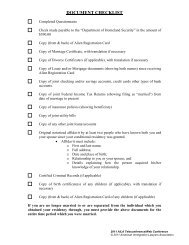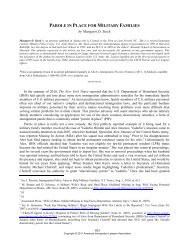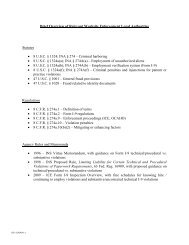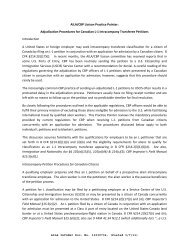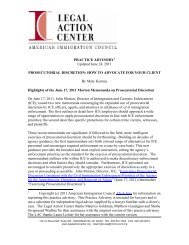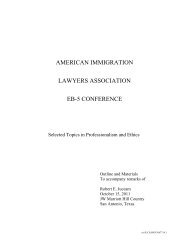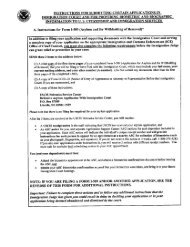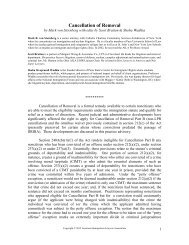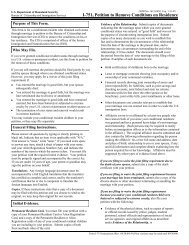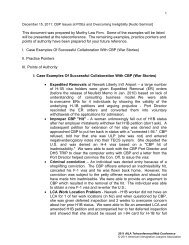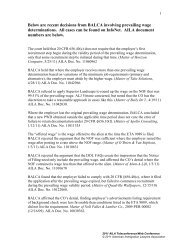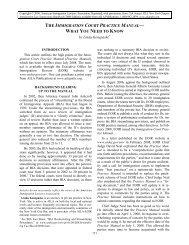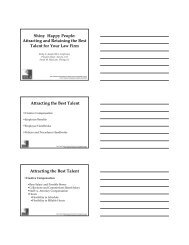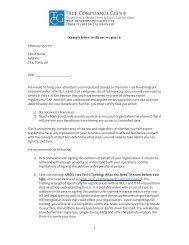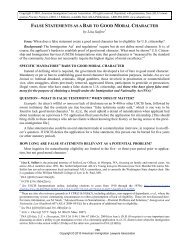Ch 5-Motions before the Immigration Court - AILA webCLE
Ch 5-Motions before the Immigration Court - AILA webCLE
Ch 5-Motions before the Immigration Court - AILA webCLE
You also want an ePaper? Increase the reach of your titles
YUMPU automatically turns print PDFs into web optimized ePapers that Google loves.
138 IMMIGRATION JUDGE BENCHBOOK<br />
• to rescind an order of deportation/removal entered in absentia pursuant to INA §242B(c)(3); INA<br />
§240(b)(5)(C)(ii); 8 C.F.R. §1003.23(b)(4)(iii); or<br />
• to apply or reapply for asylum or withholding of deportation or removal and is based on changed country<br />
conditions arising in <strong>the</strong> country of nationality or <strong>the</strong> country to which removal, deportation or exclusion has<br />
been ordered, if such evidence is material and was not available and could not have been discovered or presented<br />
at <strong>the</strong> previous proceeding. See also INA §240(c)(7)(C)(ii); 8 C.F.R. §§1003.2(c)(3)(ii) and<br />
1003.23(b)(4)(i); Matter of J-J-, 21 I&N Dec. 976 (BIA 1997). If <strong>the</strong> original asylum application was denied<br />
based upon a finding that it was frivolous, <strong>the</strong>n <strong>the</strong> alien is ineligible to file ei<strong>the</strong>r a motion to reopen or reconsider,<br />
or for a stay of removal. 8 C.F.R. §1003.23(b)(4)(i); or<br />
• agreed upon by all parties and jointly filed. 8 C.F.R. §1003.23(b)(4)(iv). Notwithstanding such agreement,<br />
<strong>the</strong> parties may contest <strong>the</strong> issues in a reopened proceeding. See 8 C.F.R. §1003.2(c)(3)(iii) (motions to reopen<br />
<strong>before</strong> Board of <strong>Immigration</strong> Appeals). DHS may not waive statutory bars to relief by joining in a motion.<br />
An <strong>Immigration</strong> Judge may not reopen a matter for relief despite <strong>the</strong> fact that <strong>the</strong> parties have jointly<br />
moved in <strong>the</strong> face of a statutory bar. Former INA §242B; or<br />
• filed by <strong>the</strong> DHS in removal proceedings pursuant to section 240 of <strong>the</strong> Act; or those motions filed by <strong>the</strong><br />
Service in exclusion or deportation proceedings, when <strong>the</strong> basis of <strong>the</strong> motion is fraud in <strong>the</strong> original proceeding<br />
or a crime that would support termination of asylum in accordance with 8 C.F.R. §1208.22. See 8 C.F.R.<br />
§§1003.2, 1003.23(b)(1), 1208.24(f).<br />
15. An alien in removal proceedings will not be prima facie eligible for voluntary departure, cancellation of<br />
removal, and/or adjustment of status for a period of ten years, if he or she received <strong>the</strong> section 240 warnings<br />
and failed to appear for <strong>the</strong> hearing absent exceptional circumstances. INA §240(b)(7). An alien in removal<br />
proceedings who fails to depart as required under an order of voluntary departure shall be subject to a civil<br />
penalty of not less than $1000 and not more than $5000, and will not be prima facie eligible for voluntary<br />
departure, cancellation of removal, and/or adjustment of status for a period of ten years (specifically, sections<br />
240A, 245, 248, 249). However, <strong>the</strong>se restrictions on relief do not apply to relief under §240A or §245 on <strong>the</strong><br />
basis of a petition filed by a VAWA self-petitioner, or a petition filed under §240A(b)(2), or under §244(a)(3)<br />
(as in effect prior to March 31, 1997), if <strong>the</strong> extreme cruelty or battery was at least one central reason for <strong>the</strong><br />
alien’s overstaying <strong>the</strong> grant of voluntary departure. INA §240B(d)(2). The statute requires that <strong>the</strong> “order<br />
permitting <strong>the</strong> alien to depart voluntarily shall inform <strong>the</strong> alien of <strong>the</strong> penalties under this subsection.” Section<br />
240B(d)(3) of <strong>the</strong> Act. Section 240B(d) of <strong>the</strong> Act does not refer to an excuse based on “exceptional circumstances”<br />
for failing to timely depart. Section 240B(d) of <strong>the</strong> Act also does not refer to limitations on discretionary<br />
relief for failure to report for removal as required. However, proposed rules published September 4,<br />
1998 [63 Fed. Reg. 47208] do seek to add a 10-year bar on relief, including asylum, for failure to timely surrender<br />
for removal absent exceptional circumstances. See also In re Zmijewska, 24 I&N Dec. 87 (BIA 2007)<br />
(holding that <strong>the</strong> BIA lacks authority to apply an “exceptional circumstances” or o<strong>the</strong>r general equitable exception<br />
to <strong>the</strong> penalty provisions for failure to depart within <strong>the</strong> time period afforded for voluntary departure).<br />
16. The BIA has held that an alien who during <strong>the</strong> pendency of a period of voluntary departure, files a motion<br />
to reopen in order to apply for suspension of deportation is statutorily ineligible for suspension pursuant to<br />
former section 242B(e)(2) of <strong>the</strong> Act, if he or she subsequently remains in <strong>the</strong> United States after <strong>the</strong> scheduled<br />
date of departure, provided <strong>the</strong> notice requirements of <strong>the</strong> section have been satisfied and <strong>the</strong>re is no<br />
showing that failure to depart timely was due to “exceptional circumstances” as provided in section<br />
242B(f)(2) of <strong>the</strong> Act. Matter of Shaar, 21 I&N Dec. 541 (BIA 1996), aff’d, 141 F.3d 953 (9th Cir. 1998);<br />
Mardones v. McElroy, 197 F.3d 619 (2d Cir. 1999) (citing Shaar with approval). However, in Azarte v.<br />
Ashcroft, <strong>the</strong> Ninth Circuit overruled its decision in Shaar, determining that Shaar has been superceded by<br />
statute (post-IIRIRA cases) based on <strong>the</strong> fact that Shaar relied on a pre-IIRIRA voluntary departure statutory<br />
provision, since repealed; nei<strong>the</strong>r <strong>the</strong> voluntary departure statute nor <strong>the</strong> regulations on motions to reopen under<br />
prior law had time limits; and prior voluntary departure grants were for much longer periods of time.<br />
Azarte v. Ashcroft, 394 F.3d 1278 (9th Cir. 2005) (voluntary departure period tolled in removal proceedings<br />
where motion to reopen filed with BIA within <strong>the</strong> voluntary departure period, with a request for a stay);



